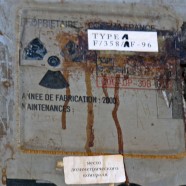Towards a new Chernobyl ?
Twenty-eight years following the Chernobyl nuclear disaster, Ukraine is confronted with political turmoil. In this context, management issues concerning the Ukrainian nuclear industry are dangerously put aside. There are 15 nuclear reactors in Ukraine, all fueled by Russia. They were designed in EX-USSR in the 1960s and 1970s and do not meet safety regulations in place today in Ukraine. However, in 2012 the Ukrainian government decided to implement life extensions of 20 years for 11 of its oldest reactors which were to be decommissioned from 2015. Under the current financial and political difficulties, it is doubtful that necessary funds will be available. Important investments are needed to guarantee the adequate radiation protection of workers responsible for upgrading the sites as well as the safety of the reactors beyond the initial life-span. The reactors life extensions are financed by the international community, notably European Bank for Reconstruction and Development (EBRD). The nuclear life extensions have not been subject to a public Environmental Impact Assessment and are not in compliance with the ESPOO Convention which addresses transboundary environmental and health impacts issued by industrial projects.
Stocamine* and Cigéo** in the Same Boat
*Stocamine at Wittelsheim near Mulhouse was a center for deep Storage- 550 meters- for non-recyclable and non-radioactive toxic waste in a salt bed. Between February 1999 and September 2002, 44,000 tons of waste has been stored there.
** Cigéo is at the borders of the Meuse and Haute-Marne is an in depth storage project – 500 meters – for non-recyclable radioactive waste in a layer of clay.
In 1997, the prefectural authorization for Stocamine included a 30-year operation and demanded removal of the after that term except in case of an authorization renewal. Reversibility was accompanied by technical and financial provisions ensuring, at any time, the withdrawal of all or some of the waste.
Delivery of nuclear fuel to Japan. Position of Robin des Bois
The new Japanese Nuclear Safety Authority (NRA – Nuclear Regulation Authority) is considered independent. It will publish this summer 2013 a collection of basic safety rules and prescribe generic or specific work to each nuclear site in the archipelago.
These preventive improvements will take several months to a few years. They will be carried out under the precondition that the political decision to relaunch nuclear power is affirmed and accepted by civil society.
The risks of a transoceanic shipping of spent fuel containing plutonium are unacceptable today, particularly because of political, military and nuclear tensions between North Korea, South Korea and Japan.
Fessenheim : To be shut down or not ?
In any event, an immediate decision on the closure or continued operation of the nuclear center in Fessenheim is imperative. Fessenheim does not make tea. Operators and contractors are responsible for handling of radioactive fuel and monitoring of nuclear fission. The staff has been under pressure for a year now, which is absolutely inconsistent with the serenity and concentration required when working at a nuclear plant. Prolonging the uncertainty is irresponsible of the government.
The handling, storing, and transport of hydrogen peroxide leads to many accidents and releases of exothermic vapors that have could potentially cause burns to employees and first-aid attendants every year. Such accidents occur in paper mills, agribusiness, and water purification centers.
MSC Flaminia : to remove the doubts about radioactivity
MSC Flaminia
Press release no. 4
Inspection of the damaged container ship before she crosses the English Channel and the North Sea will take place in the coming days.
German experts along with British, Dutch and French specialists shall examine the condition of the vessel, her containers and her cargo.
Robin des Bois wishes this expertise to be completed by a radiological diagnosis of the ship. Hundreds of containers are damaged and the charterer of MSC Flaminia, Mediterranean Shipping Company (MSC), is known to occasionally transport radioactive materials. The company is also known for a lack of transparency when it comes to publishing, when required, an inventory of transported goods. In November 1997, the MSC Carla broke in two off the Azores during a journey from Le Havre to Boston. MSC have remained silent with regards to the nature of the cargo, and it was three days after the accident that the French Nuclear Installations Safety Directorate (DSIN) announced that three sealed radioactive sources for use in American hospitals were aboard MSC Carla; they sank with the fore section, whilst the aft section was towed to the Canary Islands.










